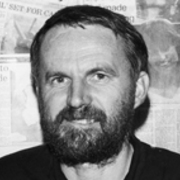
John Maynard
John Maynard is a rare survivor in the ephemeral business of film producing. After 30 years of continuous activity in both New Zealand and Australia, he is highly regarded on both sides of the Tasman.
Maynard is recognised particularly for his support and encouragement of emerging talent, often with risky and original films. Most notably, he helped launch the feature film making careers of acclaimed directors Vincent Ward and Jane Campion.
Maynard was born in Australia and was appointed foundation director of the Govett-Brewster Art Gallery in New Plymouth in 1967. The gallery opened in 1970 with Real Time, a major light-and-sound environment set up in collaboration with Leon Narbey.
In 1971 Maynard resigned from the gallery, to study and travel in Australia, India, Europe and Britain. During this period his play Partisan: Bound to Assist was broadcast on Kiwi television to receptive audiences. The teleplay involved a young lawyer and a civil liberties organisation boss; plans to turn it into a series eventuated. In 1975 Maynard was appointed Exhibitions Officer at the Auckland City Art Gallery.
By the late 70s he had transfered his attention to moving pictures, forming company Phase Three Films with director Geoff Steven and Piers Davies. Maynard's first feature as producer was Steven's small town tale Skin Deep. The two would work together again on two ambitious documentaries filmed in China, The Humble Force and Gung Ho. Maynard also produced a successful documentary for Leon Narbey (the cameraman who had shot all the above projects) — Man of the Trees, about conservationist Richard St. Barbe Baker.
Maynard's next feature was Vincent Ward's Vigil (1984) the first New Zealand film to be selected for a competitive section at the Cannes Film Festival. Set on a windswept farm, this ambitious mood piece marked the first time a so-called 'arthouse' film from New Zealand won widespread acclaim overseas. Ward's follow-up The Navigator lost a key investor shortly before filming was set to start; Maynard successfully resurrected it as an Australian-NZ co-production, after he had relocated across the Tasman (although the film was shot in NZ). Ward's fantastical vision of modern day Auckland as seen by visitors from the past involved extended night shoots, horses on boats and a giant mock-up of a nuclear submarine.
Maynard clinched an amazing hat-trick the following year with Jane Campion's feature film debut, Australian-shot family tale Sweetie (1989). In the process he became the only Australasian producer to have three consecutive pictures in the running for the top award at Cannes, the Palme D'Or.
Campion's next film eclipsed her first by far. Originally made for television but ultimately an award-winner at multiple film festivals, An Angel At My Table (1990), produced by Maynard and his partner Bridget Ikin, won acclaim and established Campion as a world class director.
These are the headliners on a long slate of Maynard's productions. Titles that found less purchase with audiences include Geoff Steven's second feature Strata, cinematographer Leon Narbey's The Footstep Man, Anna Campion's English-shot Loaded, and Sweetie co-writer Gerard Lee's comedy All Men Are Liars.
The name of Narbey's picture was resurrected for a distribution company Maynard ran for a few years in the 1990s. Footstep Pictures specialized in assisting small independent pictures into cinemas. Its greatest success was Once Were Warriors, which did major business. Arenafilm was the name of Maynard's production company.
After coming and going for some time, Maynard finally plumped for Australia as his permanent base. His taste for aesthetically and politically challenging films has remained undimmed, and resulted in some strong pictures, notably Rowan Woods' acclaimed crime family drama The Boys — for which some Australian script assessors questioned putting "these scum" on screen — and Romulus My Father, helmed by actor Richard Roxburgh. The Bank and East Timor tragedy Balibo were both directed by Maynard's Arenafilm business partner Robert Connolly.
In 2005, in recognition of his support for directors and the ADG, the Australian Directors Guild awarded their highest honour to Maynard, the Cecil Holmes Memorial Award.
Maynard went on to establish company Felix Media with Bridget Ikin, to create screen projects which offer "memorable and provocative insights into the way we view our world, our times and ourselves".
Sources include
Felix Media website. Accessed 9 June 2017
Conor Bateman, 'Fell - An Interview with Kasimir Burgess, Director, and John Maynard, Producer/Distributor'. Four Three Film website. Loaded 12 June 2014. Accessed 8 July 2016
Michael Fitzgerald, 'Darkness of the Soul' (Review of The Boys) - Time magazine, 11 May 1998
'John Maynard' Maynarduts website. Loaded 15 October 2009. Accessed 8 July 2016
'John Maynard: Producer' Fell film website. Accessed 8 July 2016